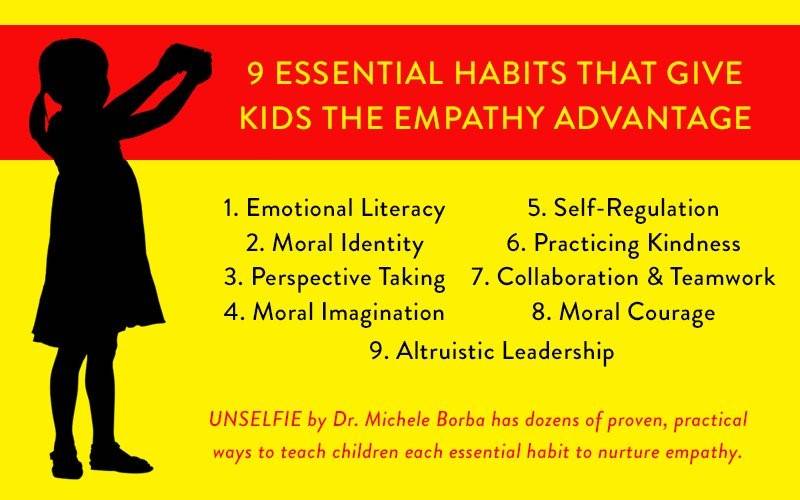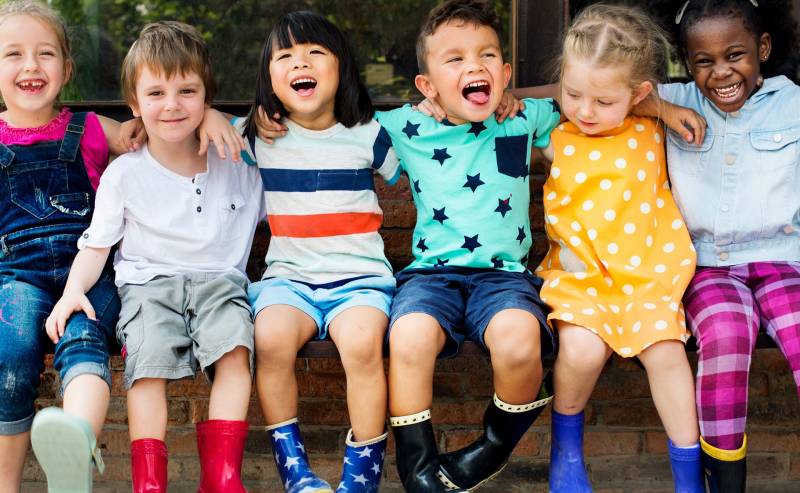In the age of the selfie, Dr. Michele Borba says self obsession has led to the erosion of empathy in kids. "Children are hard wired for empathy. But unless we cultivate it, it lies dormant," she said.
At a recent event held at the Exploratorium, Borba said long term research showed an alarming societal shift. Since 2000, empathy in American kids, she said, "began to nosedive faster than any other group of kids in the world. It has now nosedived 40 percent. While narcissism... has gone up 58 percent."
In her book "UnSelfie: Why Empathetic Kids Succeed in Our All-About-Me World," Borba lays out nine ways to raise kids who are more caring, compassionate, and concerned about others.
1. Emotional Literacy: Encourage Discussing Feelings
Emotional literacy, says Borba, is the gateway to empathy. "Empathy is feeling with someone," she said at a recent event.
You can't feel with someone, if you don't know how the person feels." She recommends talking about emotions with your kids. Give them the words to describe their emotions, and learn how to read them in other people. Encourage them to speak openly about their feelings.
Another tip to help them maintain connection: when you're talking to someone, make sure you're focused on the speaker. Look at their eyes, not down at a device or somewhere else. Parents should be modeling this behavior as well, so phone down when you're talking to your kids.
2. Moral Identity: Focus on Principles
When we praise children, we tend to focus on their cognitive, social and physical strengths. But equally important, are their moral accomplishments. "We're also not as intentional as we used to be, when cultivating empathy," she said. Instead of "What kind thing did you do?" the focus is often on "What did you get?" in terms of a grade.
Border encourages caretakers to figure out their personal core beliefs by talking about character strengths. What kind of principles does your family follow? Take note of when they're being caring and helpful, and they'll start to think of themselves as caring and helpful people. "You act how you see yourself to be," Borba said.
Overpraising, however, can diminish empathy. Kids will start to see these behaviors as expectations to be met, rather that virtues to be embodied. If a child comes to expect accolades for every instance of "good" behavior, it may be time to rein it in. "It's about striking a balance between building self-esteem while avoiding self-centeredness," Borba said.
3. Perspective Taking and Discipline

According to Borba, parents discipline their kids an average of fifty times a day. Many of those actions requiring discipline are related to the child being inconsiderate. Borba calls these "empathy-stretching opportunities." Simply put, try to get your kid to imagine themselves in the other shoes. Did they say something mean to their friend that upset them? How would they feel if the tables were turned? How can they make it up to their friend?
When disciplining though, avoid displaying the kinds of behaviors you don't want your kids to emulate. Borba says decades of research has shown that spanking kids leads them to display aggression and antisocial behavior. Yelling damages the parent-child relationship and creates a poor model. Even time-outs can make kids feel rejected, at a moment when what they really need is support. If parents are thinking about using rewards to enforce good behavior, that can backfire too. Instead of empathy they'll develop an expectation that the only reason to be kind is if they get something out of it.
4. Moral Imagination: Use Books
Don't underestimate the power of a parable. Or, in this case, any kind of book. There are countless examples of books featuring characters faced with moral dilemmas. Borba recommends reading books over digital entertainment options, to develop a child's imagination. The added benefit is that when adults read with children, they can take time in the middle of the story to talk about what's happening and ask questions about what they would do if they were in the character's quandary.
5. Self-Regulation: Identify 'Body Alarms'
Emotional self regulation can be a challenge for both kids and adults. When we feel stressed of angry it can trigger a physical reaction. We might clench our fists or teeth, we may get a headache or stomach ache. Borba said teaching your kids to identify their "body alarms" let's them know when they need to take a minute to decompress or do something calming, like deep breathing.
Modeling emotional self-regulation is the best way to help your kids learn it. Inuit parents have been using a calm and collected strategy in child-rearing for generations.
6. Practicing Kindness
This may seem like an obvious one, but Borba has found that parents often focus on getting their kids to strive for achievement and success over cultivating their personality. "One of the best ways to build empathy is also having our kids see it in action," Borba said.
Define what it means to be a kind person by demonstrating kindness in front of your child. Then help them come up ways to show it themselves. Get your kids into the practice of doing kind things, whether it's inviting another child to play with them or paying someone a compliment. When kids think about what might make someone happy and why, it reinforces empathy.
7. Collaboration & Teamwork
There's no 'I' in 'empathy.' The hyper-competitiveness of today's world reinforces an "I'm better than you" mentality in kids, which makes them less empathetic. Shift the focus from 'me' and 'us,' when it comes to school and your own family. Provide opportunities for them to collaborate with other kids and hold family meetings where you can problem solve together.
8. Moral Courage
If kids see someone else being bullied, will they intervene? Do they know how to intervene? "What every child has told me that we're failing to do," Borba said, "is show them how."
Run through strategies on how to diffuse a bully situation with your child. That could include just going up and standing next to the kid being bullied or going to get a teacher. "We've got to be a little more specific on saying, 'Let's figure out some things you can do,' and then they'll be more likely to be compassionate."
When children talk about someone being a bully, believe them and follow up. Borba has found that many children say they worry they won't be believed by adults, or that the adult won't act, leaving the child open to retaliation. If they don't think they can trust you, they're more likely to just remain a bystander the next time something happens. 
9. Altruistic Leadership
Ask a kid what they want to be when they grow up, and the answer might include options like sports star, pop star, or famous actor. In "UnSelfie," Borba says kids are growing up in a world that has become obsessed with celebrities who flaunt possessions, appearance and consumption over character values like compassion, charity and generosity.
Help kids become changemakers by giving them opportunities for leadership and emphasizing the importance of societal contribution. Do things together to give back, like volunteer at a charity or gather used clothes and toys for donation. "The culture is changing. Our parenting styles are changing. Technology has come," Borba said, "It means we've got to be a little more intentional if we want to raise strong, good kids."
